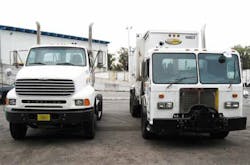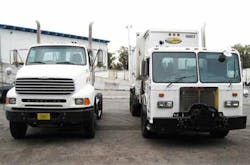Green Fleet of the Month: Filtered savings
“Really, the vehicles tell us when it’s time to change [the oil],” says Kleintop, ISD service managerheavy equipment for the county. “We’ve had some vehicles that haven’t had an oil change in five years. The longer it runs, the better [the system] seems to work.”
The Puradyn system removes contaminants from the oil and then adds in elements lost in the filtering process. According to the company, not only can the oil then be reused, but it also significantly improves engine wear.
ADDITIVE REPLACEMENTS
“Every system filters oil, so that’s not unique,” says Kleintop, who has been with Miami-Dade since 1999. “What this does that’s different is [related to] the filter element itself; it replaces the additive package that is removed when you change the filter.”
With a typical 32-40 quart capacity, an oil change for one of the 2,500 heavy vehicles in Miami-Dade’s 11,000-vehicle fleet is not cheap. Since switching to the Puradyn system back in 1999, the cost savings have been significant for the county, Kleintop says, noting that the county no longer tracks actual dollar amounts saved because the system proved so effective at reducing costs. Still, he estimates the county saved about $1,100 per year per vehicle in oil costs alone with no negative impact on the engine.
“We figured [that over] a 10-year lifespan on trucks we bought in 2004, we would save around $100,000 on 46 trucks [just in oil changes] plus 1,700 hours of downtime,” he says.
When switching to the system, the county did suffer a revenue loss; it used to sell its used oil to the tune of 12 cents per gallon. “But we also lost the cost of storing it and the cost of getting storage approved each year,” Kleintop relates. “And we also went to 499-gal. tanks instead of 5,000-gal. tanks, so there is a cost savings in tanks as well.”
Miami-Dade has now installed the system on all of its Class 7 and 8 vehicles, about 700 units in all.
“It’s been very successful,” Kleintop says. “[Puradyn’s] facilities and their manufacturing plant are only about 50 mi. from us. One day their CEO came down and showed me how the system works, and it’s a really nice system.”
Installed downstream of the existing full-flow filter, the system works by filtering the oil through a disposable element with time-release additives to replenish depleted levels. Puradyn says its patented process filters solid contaminants down to below one micron. Using a heated chamber, the system then evaporates water, fuel and other harmful gaseous vapors trapped in the oil before reintroducing the now “clean” oil back into the engine or hydraulic tank.
According to Puradyn, the system does not affect an engine’s oil flow or pressure and does not replace the conventional full-flow filtration system; it only “enhances and works in conjunction with it.” Puradyn says that use of the system can result in a 90% reduction in new oil purchases and a corresponding reduction in oil-related maintenance costs and improved vehicle uptime.
OTHER ALTERNATIVES
Miami-Dade is also running seven hydraulic hybrid trucks from Autocar. The Xpeditor E3 refuse vehicles utilize Parker Hannifin’s RunWise advanced series hybrid drive system. According to Parker, the system reduces fuel usage between 30 and 50% and emissions as much as 38 tons per year.
RunWise technology integrates mechanical and hydraulic drive elements into a 3-spd. transmission optimized for efficiency at all speeds, Parker says. Shifting is automatic. The series hybrid drive system recovers more than 70% of braking energy normally lost. The more the vehicle stops, the more energy that is recovered.
A standard friction braking system uses pressurized hydraulic fluid to decelerate the vehicle while recovering that energy. The stored energy is then used to launch the vehicle.
Those trucks have performed well enough, Kleintop says, that the county is likely purchasing more of them.
While Kleintop says alternative fuels such as CNG are not a viable option at this time for the fleet due to the lack of infrastructure, the county continues to look at other ways to reduce fuel usage and emissions, including setting idling limits and switching to a heavier tire compound in the hopes of increasing the number of retreads per tire.

